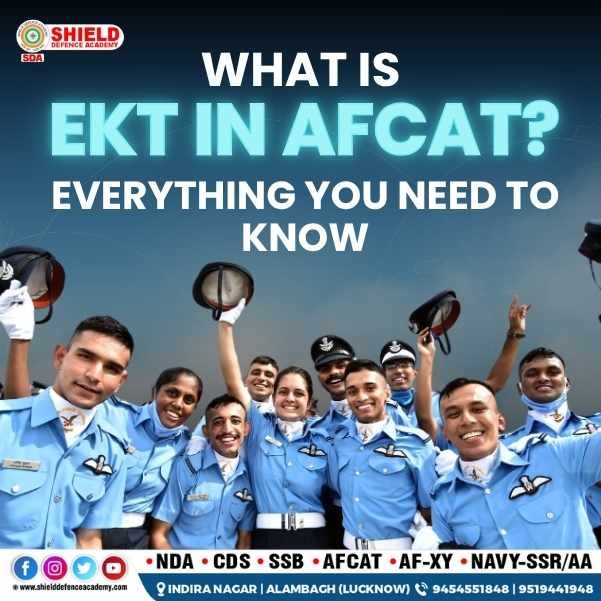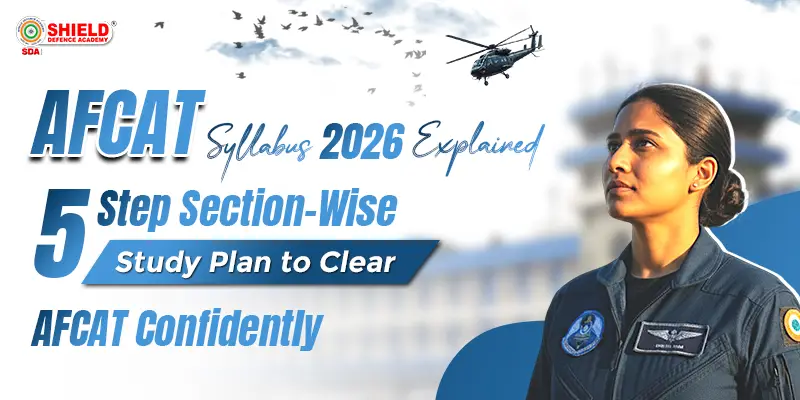What is EKT in AFCAT Everything You Need to Know all details by NDA coaching in UP
In this detailed guide created by Shield Defence Academy, known as the best NDA coaching in UP, we’ll walk you through everything about EKT in AFCAT —its structure, eligibility, syllabus, preparation tips, and more. By the end of this article, you’ll have a clear roadmap to crack this technical hurdle and soar high with the IAF. Planning to join the Indian Air Force through AFCAT? If you’re aiming for the Technical Branch, then you must know about EKT—the Engineering Knowledge Test. Many aspirants are aware of AFCAT, but few understand the role and significance of EKT.

AFCAT & EKT – The Basics
What is AFCAT?
AFCAT, or Air Force Common Admission Test, is the primary written exam for recruiting candidates into the Indian Air Force across three main branches: Flying, Ground Duty (Technical), and Ground Duty (Non-Technical).
What is EKT in AFCAT?
EKT stands for Engineering Knowledge Test. It is an additional test conducted right after the AFCAT paper, exclusively for candidates applying for the Technical Branch. This test evaluates your understanding of engineering concepts and stream-specific knowledge.
Why is EKT Important?
EKT serves as a filter to ensure that only technically capable individuals move forward in the recruitment process for technical roles. It assesses your command over your core engineering subjects, validating your ability to handle the technical responsibilities within the IAF.
Who Needs to Take EKT?
Eligibility Criteria
Only those candidates who have pursued or are in the final year of their engineering degrees in specified disciplines (such as Electrical, Mechanical, or Computer Science) are eligible for the Technical Branch and hence, must take EKT.
Applicable Branches
EKT is mandatory for:
-
Aeronautical Engineering (Electronics)
-
Aeronautical Engineering (Mechanical)
If you apply for the Flying or Ground Duty (Non-Technical) branches, you do not need to appear for the EKT.
EKT Exam Pattern
Mode of Exam
-
Format: Online (CBT)
-
Conducted Immediately after the AFCAT paper
Duration
-
45 Minutes
Number of Questions & Marking Scheme
-
Total Questions: 50
-
Maximum Marks: 150
-
Marking:
-
+3 for each correct answer
-
–1 for each incorrect answer
-
0 for unanswered questions
-
EKT Syllabus – What You Need to Study
The syllabus is divided into three streams based on engineering backgrounds:
1. Mechanical Engineering
-
Thermodynamics
-
Engineering Mechanics
-
IC Engines
-
Strength of Materials
-
Theory of Machines
2. Computer Science/IT
-
Operating Systems
-
Programming Languages (C, C++, Java)
-
Data Structures and Algorithms
-
Computer Networks
-
Software Engineering
3. Electrical & Electronics
-
Basic Circuit Theory
-
Digital Electronics
-
Microprocessors
-
Communication Systems
-
Control Systems
Each candidate must select one stream based on their educational qualification. The Shield Defence Academy syllabus plan includes topic-by-topic coverage and weekly progress tracking.
How to Prepare for EKT – Smart Tips
Manage Time Wisely
Create a study plan that balances both AFCAT and EKT. Ideally, dedicate at least 1.5 to 2 hours daily to technical subjects.
Use Quality Study Resources
Use trusted engineering books and EKT-focused materials. Shield Defence Academy provides stream-specific modules that make learning efficient.
Practice Makes Perfect
Mock tests, previous year papers, and quizzes help boost speed and accuracy. Make it a habit to take at least two mocks per week.
Shield Defence Academy’s Unique Strategy
Being among the top NDA coaching centres in UP, Shield Defence Academy offers structured and result-driven EKT preparation:
Expert Instructors
Classes are led by experienced faculty from engineering and defence backgrounds.
Personal Mentorship
Each student is assigned a mentor to guide through difficult subjects and track progress.
Regular Assessments
Weekly tests and mock exams are designed to replicate actual exam scenarios, helping you build confidence.
AFCAT vs EKT – Key Differences
| Feature | AFCAT | EKT |
|---|---|---|
| Who Takes It | All AFCAT candidates | Only Technical Branch aspirants |
| Subjects | English, Reasoning, GK, Math | Engineering Core Subjects |
| Duration | 2 Hours | 45 Minutes |
| Total Marks | 300 | 150 |
| Eligibility | Any graduate | Engineering graduates |
Top Books for EKT Preparation
Mechanical Stream
-
“Mechanical Engineering for Competitions” by R.K. Jain
-
“Thermal Engineering” by R.S. Khurmi
Computer Science
-
“Let Us C” by Yashwant Kanetkar
-
“Operating System Concepts” by Galvin
Electronics/Electrical
-
“Principles of Electrical Engineering” by V.K. Mehta
-
“Digital Electronics” by Morris Mano
Mistakes to Avoid While Preparing for EKT
Neglecting Core Subjects
Don’t take your engineering fundamentals lightly. EKT is technical and requires conceptual clarity.
Skipping Revision
Without consistent review, even strong topics fade over time.
Not Solving Mocks
You must practice under time limits to succeed. Mocks highlight both strengths and weak points.
EKT Cut-Off Trends & Safe Score
Past Cut-Offs
-
2022: Around 40 marks
-
2023: 42–45 marks
Safe Score
Aim for 50–60 marks to ensure you comfortably cross the cut-off and secure your position in the merit list.
What Happens After EKT?
Next Steps in Selection
If you clear EKT in AFCAT, you’re called for the SSB interview, followed by medical tests.
EKT’s Role in Merit
Your EKT score is crucial—it contributes to your final merit position for Technical Branch selection.
Real Success Stories – Shield Defence Academy Alumni
At Shield Defence Academy, students have successfully cracked EKT with structured guidance. One such example is Ankur Singh, now an IAF officer, who attributes his success to weekly mock drills and focused one-on-one mentoring sessions at the academy.
His advice? “Stick to basics, follow a disciplined routine, and don’t skip the mocks!”
Conclusion ABOUT EKT in AFCAT
To wrap it up, the Engineering Knowledge Test (EKT) is your gateway to joining the Technical Branch of the Indian Air Force. It’s not just an exam; it’s a crucial step in proving your engineering capabilities.
Whether you’re from Mechanical, CS, or Electrical backgrounds, cracking EKT requires consistent preparation and smart strategies. The best way to succeed is with expert mentorship—and that’s exactly what Shield Defence Academy, the leading NDA coaching institute in UP, offers.
FAQs About EKT in AFCAT
Q1. Is EKT a separate exam from AFCAT?
It is conducted right after AFCAT but only for technical candidates.
Q2. What is the syllabus of EKT?
It covers your core engineering subjects like CS, Mechanical, or Electrical based on your qualification.
Q3. Can I skip EKT if I only want to join the Flying Branch?
Yes. EKT is only for Technical Branch aspirants.
Q4. How many questions are there in EKT?
There are 50 questions, and the total paper is worth 150 marks.
Q5. Is EKT very difficult?
If you’ve studied your engineering subjects sincerely, it’s quite manageable with practice.










